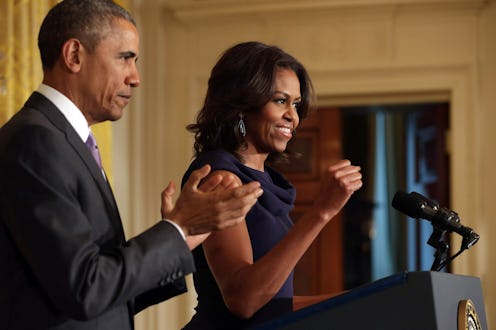News
The Obamas Just Launched An Important Initiative
On Tuesday, the White House launched the "Let Girls Learn" initiative that would increase efforts to help young girls across the world attend and complete school. In what White House Senior Adviser Valerie Jarrett called a great way to welcome International Women's Day on March 8, President Barack Obama and First Lady Michelle Obama took to the podium to announce the program together at a press conference on Tuesday.
Speaking first, the president said that while girls' education was close to his heart, being a father to two girls, Sasha and Malia, it was also a foreign policy issue.
Every girl on this planet has value. Every girl on this planet deserves to be treated with dignity and quality, and that includes the chance to develop her mind and her talent. ... I'm convinced that a world in which girls are educated is a safer, stabler, more prosperous place.
First Lady Michelle then took her turn at the microphone to detail the program — 7,000 Peace Corps volunteers in over 60 countries will work with local community leaders to identify the obstacles in attending and finishing school that girls in these countries face. She also announced that her trip to Cambodia and Japan in March will be aimed at promoting the program.
I see myself in these girls. I see our daughters in these girls.
A White House statement released before the speech said:
62 million girls around the world — half of whom are adolescent — are not in school. These girls have diminished economic opportunities and are more vulnerable to HIV/AIDS, early and forced marriage, and other forms of violence.
Yet when a girl receives a quality education, she is more likely to earn a decent living, raise a healthy, educated family, and improve the quality of life for herself, her family, and her community.
Launched last summer through the United States Agency for International Development (USAID), the program will provide new training for members of the Peace Corps for placement in 11 countries in its first year — Albania, Benin, Burkina Faso, Cambodia, Georgia, Ghana, Moldova, Mongolia, Mozambique, Togo and Uganda.
Jarrett reiterated on MSNBC Tuesday morning ahead of the launch that girls who finish school have a higher chance of earning a decent wage and improve the lives of their families. Jarrett added:
The best way to economic security, the best way to pursue your dreams, is if you can have an education.
Girls' education in developing countries has been a prevalent issue in recent years, gaining a surge of attention on the world stage when a Pakistani teenager, Malala Yousafzai, made headlines for standing up to the Taliban to champion girls' right to education. The First Lady had also pointed to Yousafzai — the youngest Nobel Peace Prize laureate — in her speech as an example of young girls themselves advocating for their own education.
Image: Whitehouse.gov (2); Getty Images
